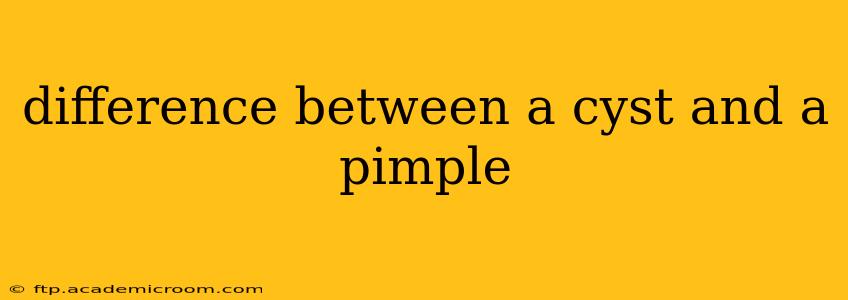The Difference Between a Cyst and a Pimple: A Comprehensive Guide
While both cysts and pimples manifest as bumps on the skin, understanding their underlying causes and characteristics reveals significant differences. This guide will delve into the distinctions, helping you differentiate between these common skin issues.
What is a Pimple (Acne)?
A pimple, or acne, is a common skin condition resulting from blocked pores. Sebum (an oily substance produced by the skin) combines with dead skin cells, clogging the pores and creating a breeding ground for bacteria, primarily Cutibacterium acnes. This inflammation leads to the characteristic red, swollen, and often pus-filled bump. Pimples typically appear on the face, chest, back, and shoulders and can vary in severity from mild blackheads and whiteheads to more inflamed pustules and nodules.
What is a Cyst?
A cyst is a sac-like structure under the skin filled with fluid, semi-solid material, or air. Unlike pimples, cysts aren't directly caused by bacteria, although infection is possible. Cysts can develop in various parts of the body, including the skin. They can be formed from blocked glands, tissue remnants, or infection. Skin cysts often appear as firm, round bumps that can range in size from small to relatively large. They may be painful or painless, depending on their location, size, and contents.
What are the Key Differences Between a Cyst and a Pimple?
| Feature | Pimple (Acne) | Cyst |
|---|---|---|
| Cause | Blocked pores, bacteria (Cutibacterium acnes) | Blocked glands, tissue remnants, infection |
| Depth | Superficial (within the skin's surface) | Deeper (under the skin's surface) |
| Appearance | Red, swollen, pus-filled bump | Firm, round bump; may be fluctuant (soft) |
| Size | Typically small | Can range from small to quite large |
| Pain | Can be painful, depending on severity | Can be painful or painless |
| Duration | Typically resolves within a few days to weeks | Can persist for weeks, months, or longer |
| Treatment | Over-the-counter treatments, prescription medication | Often requires medical intervention |
How Can I Tell the Difference?
Differentiating between a cyst and a pimple can be challenging, especially for those without medical training. However, several characteristics can help you distinguish between the two:
- Depth: A cyst is significantly deeper beneath the skin's surface than a pimple.
- Size: Cysts tend to be larger and more prominent than pimples.
- Texture: Cysts often have a firmer, more defined texture than pimples. While some pimples may be quite firm, a cyst will usually feel more solid and less easily compressed.
- Pain: While both can be painful, cysts are sometimes more painful or may cause a dull ache, especially larger ones.
- Duration: Pimples usually resolve much faster than cysts.
What if I suspect I have a cyst?
If you suspect you have a cyst, it's crucial to consult a dermatologist or healthcare professional for proper diagnosis and treatment. They can differentiate between a cyst and other skin conditions, and determine the most appropriate course of action. Attempting to treat a cyst at home without professional guidance can lead to complications, including infection.
Can cysts become infected?
Yes, cysts can become infected. Signs of infection include increased pain, redness, swelling, warmth to the touch, and pus drainage. If you notice these signs, seek medical attention immediately.
Are there different types of cysts?
Yes, there are many types of cysts, each with unique characteristics. Some examples include epidermoid cysts (common skin cysts), sebaceous cysts (associated with oil glands), and pilar cysts (associated with hair follicles). Only a medical professional can properly diagnose the specific type of cyst.
This information is for educational purposes only and does not constitute medical advice. Always consult with a qualified healthcare professional for any health concerns or before making any decisions related to your health or treatment.
